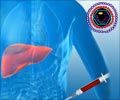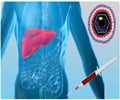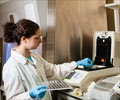New sensitive droplet digital PCR assay to measure closed circular DNA (cccDNA) enables earlier detection of hepatitis B infection, prediction of liver cancer and instituting preventive interventions earlier.
- New sensitive droplet digital PCR (polymerase chain reaction) assay found to be accurate in detecting hepatitis B virus (HBV) infection by measuring cccDNA in serum, single liver cells as well as processed tissue samples.
- HBV infection is associated with increased risk of progression to hepatocellular cancer (HCC); recently several new treatments targeting cccDNA have been established to eliminate HBV infection.
Why Droplet Digital PCR is Better Than Current Methods to Diagnose HBV Infection
- It is important to diagnose HBV infection early due to the increased risk of progression to liver cancer. Several new targeted treatments are now available to clear HBV infection, thereby preventing or reducing liver cancer risk, making early diagnosis all the more critical.
- Currently considered the gold standard to diagnose HBV infection, Southern blotting, and other assays have certain limitations like less sensitivity than ddPCR in detecting low levels of cccDNA.
"Compared to liver biopsy, serum can be obtained noninvasively, is widely used for clinical diagnostic purposes, and has a homogenous cccDNA distribution. The assay also improves the limit of detection of cccDNA," noted Dr. Liu.
Findings of Study
- Droplet Digital PCR (ddPCR) was helpful in detecting which patients could be harboring hepatocellular cancer. The team found that almost 90 percent of 68 HCC patients were cccDNA-positive in comparison to 53 percent of 79 patients without liver cancer.
- Additionally, serum cccDNA viral copy numbers i.e. viral load, was found to be more in HCC patients compared to patients without liver cancer.
- Combined evaluation of serum cccDNA and HBV-DNA was able to distinguish liver cancer patients from non-HCC patients. "This implicates cccDNA as a risk factor for HCC," said Dr. Liu.
- The scientists were also able to establish that serum cccDNA correlated positively with levels of cccDNA measured in liver samples indicating measurements could be made on serum samples.
Thus, the study suggests that droplet digital PCR and HBV DNA estimation is superior to current methods in detecting HBV infection earlier so that targeted treatment can be started earlier and reduce liver cancer risk.
In an accompanying commentary Fan Shen, MD, PhD, of the Department of Laboratory Medicine and Pathology, University of Alberta, Edmonton, AB, Canada, observed, "Quantification of serum cccDNA and HBV-DNA is an effective way to discriminate HCC patients from non-HCC patients with a sensitivity of 74.5 percent and a specificity of 93.7 percent. This is an important finding and could lead to earlier diagnosis of HCC and more accurate prediction of chronic HBV progress in a noninvasive manner."
About Hepatocellular Cancer
As per WHO estimates, 257 million individuals were infected with HBV globally, and in 2015 there were 887,000 deaths, mainly due to liver complications. Chronic HBV infection can be managed with antiviral medications such as tenofovir or entecavir to clear infection.What Is Droplet Digital PCR Assay?
Digital PCR (dPCR) is a novel technique for accurate quantification of nucleic acids. It employs similar assay reagents that are used in standard analog measurements, but measures the total number of individual target molecules such as viral DNA particles in a digital format, making it useful in many applications that require high degree of sensitivity and availability of samples is restricted.In conclusion, digital PCR method could improve diagnosis of early HBV infection so that early targeted treatment can be administered to reduce or delay HCC risk with an improved outcome for patient.
References:
- Fan Shen et al. “Hepatitis B Virus Covalently Closed Circular DNA–Selective Droplet Digital PCR”, The Journal of Molecular Diagnostics (2018). DOI 10.1016j.jmoldx.2018.03.001
















